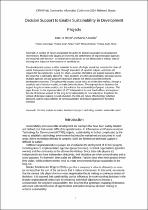JavaScript is disabled for your browser. Some features of this site may not work without it.
- ResearchSpace
- →
- Research Publications/Outputs
- →
- Conference Publications
- →
- View Item
| dc.contributor.author |
Meyer, IA

|
|
| dc.contributor.author |
Marais, Mario A

|
|
| dc.date.accessioned | 2015-03-12T09:51:15Z | |
| dc.date.available | 2015-03-12T09:51:15Z | |
| dc.date.issued | 2014-10 | |
| dc.identifier.citation | Meyer, I.A and Marais, M.A. 2014. Decision support to enable sustainability in development projects. In: CIRN Prato Community Informatics Conference, Monash Centre, Prato Italy, 13-15 October 2014 | en_US |
| dc.identifier.uri | http://hdl.handle.net/10204/7910 | |
| dc.description | CIRN Prato Community Informatics Conference, Monash Centre, Prato Italy, 13-15 October 2014 | en_US |
| dc.description.abstract | A number of factors complicate the ability to deliver sustainably on development interventions. Multiple role players are involved, the performance of implementation agencies are measured over the short- to medium term and donors do not always take a holistic view of the long-term impact of interventions on beneficiaries. The development process is often presented in terms of a logic model that consists of a chain of events from procurement of inputs, through translation of inputs to outputs, outcomes and impacts for the community. Along this chain, a number of implicit and explicit decisions affect the value that is ultimately delivered. These decisions are often uncoordinated, take place across multiple agencies and are guided by objectives that are not always explicitly linked to development outcomes. Throughout this process, scope exists to aid decision makers, through a simplistic set of decision models, to make better decisions. The emphasis is on decisions that support long-term value creation, and that enhance the sustainability of project outcomes. This paper focuses on the implementation of ICT interventions in rural South Africa, and explores the role of decision support for the long-term sustainability in rural education. It outlines the context of decision-making in rural education, the role and nature of technology selection decisions, and the value addition of conceptualisation of decision support tools for tablet selection. | en_US |
| dc.language.iso | en | en_US |
| dc.relation.ispartofseries | Workflow;14413 | |
| dc.subject | Decision analysis | en_US |
| dc.subject | Education | en_US |
| dc.subject | Development projects | en_US |
| dc.subject | Technology selection | en_US |
| dc.subject | Sustainable impact | en_US |
| dc.title | Decision support to enable sustainability in development projects | en_US |
| dc.type | Conference Presentation | en_US |
| dc.identifier.apacitation | Meyer, I., & Marais, M. A. (2014). Decision support to enable sustainability in development projects. http://hdl.handle.net/10204/7910 | en_ZA |
| dc.identifier.chicagocitation | Meyer, IA, and Mario A Marais. "Decision support to enable sustainability in development projects." (2014): http://hdl.handle.net/10204/7910 | en_ZA |
| dc.identifier.vancouvercitation | Meyer I, Marais MA, Decision support to enable sustainability in development projects; 2014. http://hdl.handle.net/10204/7910 . | en_ZA |
| dc.identifier.ris | TY - Conference Presentation AU - Meyer, IA AU - Marais, Mario A AB - A number of factors complicate the ability to deliver sustainably on development interventions. Multiple role players are involved, the performance of implementation agencies are measured over the short- to medium term and donors do not always take a holistic view of the long-term impact of interventions on beneficiaries. The development process is often presented in terms of a logic model that consists of a chain of events from procurement of inputs, through translation of inputs to outputs, outcomes and impacts for the community. Along this chain, a number of implicit and explicit decisions affect the value that is ultimately delivered. These decisions are often uncoordinated, take place across multiple agencies and are guided by objectives that are not always explicitly linked to development outcomes. Throughout this process, scope exists to aid decision makers, through a simplistic set of decision models, to make better decisions. The emphasis is on decisions that support long-term value creation, and that enhance the sustainability of project outcomes. This paper focuses on the implementation of ICT interventions in rural South Africa, and explores the role of decision support for the long-term sustainability in rural education. It outlines the context of decision-making in rural education, the role and nature of technology selection decisions, and the value addition of conceptualisation of decision support tools for tablet selection. DA - 2014-10 DB - ResearchSpace DP - CSIR KW - Decision analysis KW - Education KW - Development projects KW - Technology selection KW - Sustainable impact LK - https://researchspace.csir.co.za PY - 2014 T1 - Decision support to enable sustainability in development projects TI - Decision support to enable sustainability in development projects UR - http://hdl.handle.net/10204/7910 ER - | en_ZA |






